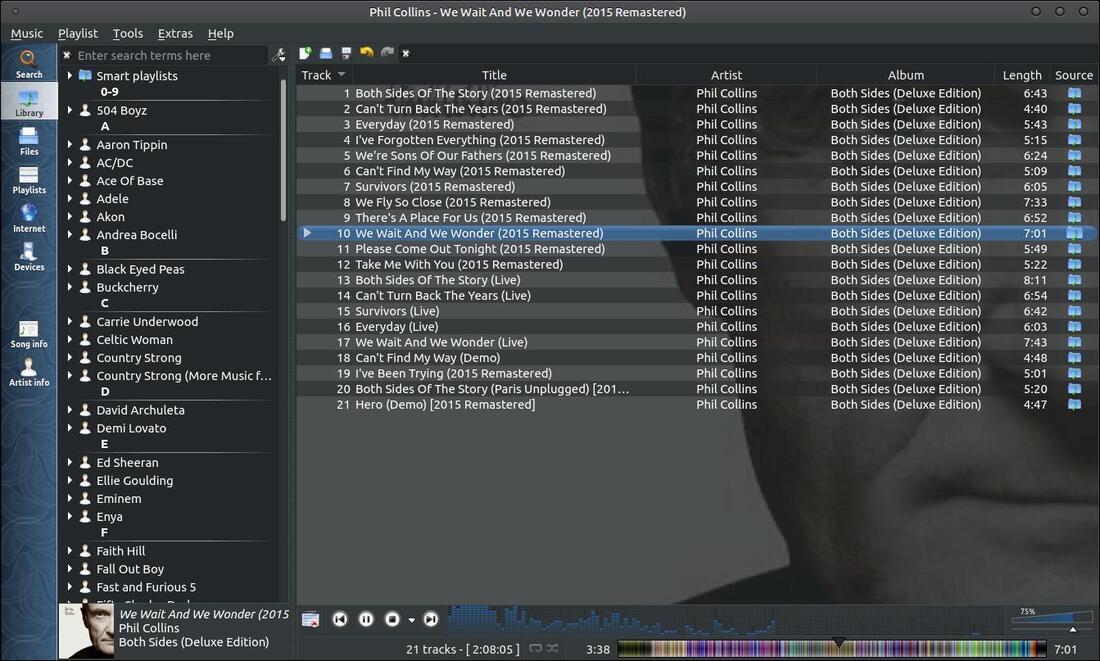Call Out
Why IBM SPSS Statistics?
IBM® SPSS® Statistics is a powerful statistical software platform. It delivers a robust set of features that lets your organization extract actionable insights from its data.
Swinsian The Advanced Music Player for Mac. Swinsian is a sophisticated music player for macOS with wide format support, folder watching, advanced tag editing and designed to be responsive even with the largest libraries. Compiling Clementine from source is easy on Linux. Download the source code package from the list above, and in a terminal window: cd bin cmake. Make sudo make install.
With SPSS Statistics you can:
- Analyze and better understand your data, and solve complex business and research problems through a user friendly interface.
- Understand large and complex data sets quickly with advanced statistical procedures that help ensure high accuracy and quality decision making.
- Use extensions, Python and R programming language code to integrate with open source software.
- Select and manage your software easily, with flexible deployment options.
SPSS Statistics is available for Windows and Mac operating systems.
See what's new in SPSS Statistics 27.0.1.0
See what's new in SPSS Statistics 27.0.1.0 Read the blog post
A powerful statistical analysis software platform
Easy to use
Perform powerful analysis and easily build visualizations and reports through a point-and-click interface, and without any coding experience.
Efficient data conditioning
Reduce data preparation time by identifying invalid values, viewing patterns of missing data and summarizing variable distributions.
Quick and reliable
Analyze large data sets and prepare data in a single step with automated data preparation.
Comprehensive
Run advanced and descriptive statistics, regression and more with an integrated interface. Plus, you can automate common tasks through syntax.
Open source integration

Enhance SPSS syntax with R and Python using a library of extensions or by building your own.
Data security
Store files and data on your computer rather than in the cloud with SPSS that’s installed locally.
Take a closer look at IBM SPSS Statistics
SPSS Statistics 27: New release
Learn about new statistical algorithms, productivity and feature enhancements in the new release that boost your analysis.
IBM SPSS Statistics tutorial
Get hands-on experience with SPSS Statistics by analyzing a simple set of employee data and running a variety of statistical tests.
A leader in statistical analysis software
Learn why G2 Crowd named SPSS Statistics a Leader in Statistical Analysis Software for Winter 2020.

Explore advanced statistical procedures with SPSS Statistics
Advanced statistics
Use univariate and multivariate modeling for more accurate conclusions in analyzing complex relationships.
Custom tables
Regression
Predict categorical outcomes and apply nonlinear regression procedures.
Decision trees
Use classification and decision trees to help identify groups and relationships and predict outcomes.
Direct marketing
Identify the right customers easily and improve campaign results.
Forecasting
Build time-series forecasts regardless of your skill level.
Clementine Para Mac Mini
Neural networks
Discover complex relationships and improve predictive models.
Categories
Predict outcomes and reveal relationships using categorical data.
Clementine Para Mac Os
Complex samples
Analyze statistical data and interpret survey results from complex samples.
Conjoint
Understand and measure purchasing decisions better.
Exact tests
Reach more accurate conclusions with small samples or rare occurrences.
Missing values
Uncover missing data patterns, estimate summary statistics and impute missing values.
Which option is right for you?
SPSS Statistics Subscription
SPSS Statistics 27
SPSS Statistics Campus Editions, GradPack and Faculty Packs
Next Steps
Buy now to get started today
If you're on Linux or a BSD variant, you can install GStreamer using yourpackage manager.
For other platforms, specifically Windows, macOS,Android, and iOS, we provide binary releases inthe form of official installers or tarballs maintained by the GStreamerproject.
Windows
Binary releases in the form of MSI installers are available. The installers aresplit into runtime and development packages. For development, you will want toinstall both packages.
- MSVC 64-bit (VS 2019, Release CRT)
- MSVC 32-bit (VS 2019, Release CRT)
- MinGW 64-bit
- MinGW 32-bit
For each of the above listed targets, a zip file with .msm modulesis available for integration into your own WiX-based app installer.
If you are not sure which to pick between MSVC and MinGW, just pick MSVC.However, do see the toolchain compatibility notesbelow which may affect you based on what toolchain your app will be built with.
NOTE: The library names in MSVC are different from MinGW; specifically the DLLsare of the form foo.dll instead of libfoo.dll.
NOTE: GstSharp .NET bindingsrequire the MSVC binaries starting with 1.18.

NOTE: Some of the plugins shipped with the MSVC binaries link to non-gstreamerlibraries built with MinGW because they are built with Autotools. See belowfor what this means for your application.
Older 1.x binary releases are also available.
Universal Windows Platform
Binary releases built to target the Universal Windows Platform (UWP). Used forshipping apps on the Windows Store, such as for an XBox, HoloLens 2, etc.
- UWP Universal (ARM64, X86, X86_64) (VS 2019, Release CRT)
- UWP Universal (ARM64, X86, X86_64) (VS 2019, Debug CRT)
UWP apps cannot use plugins that use dependencies built with MinGW because offorbidden APIs. Hence, these plugins are omitted from the binaries.
Toolchain Compatibility Notes
On Windows, you can use a number of different toolchains and versions thereof,and it is not always obvious how these can be mixed and matched with thebinaries provided above by GStreamer.
Clementine For Macbook
The first step is ensuring that you're using the correct architecture. Youshould not try to mix 32-bit code built with any toolchain with 64-bit codebuilt with any toolchain.
Next, understand that since GStreamer is written mostly in C, all APIs exportedby GStreamer libraries and plugins use C ABIs. Even plugins written in otherlanguages such as Rust, C++, C#, Python, etc, are loaded using the C ABI.
This means you can consume the GStreamer binaries from any toolchain that usesthe same C ABI. Using the same CRT (C Runtime)is better, but it's not always a requirement. Here's the matrix outlining theCRT used for each GStreamer version:
| GStreamer version | MinGW | MSVC |
|---|---|---|
| 1.14.x | msvcrt.dll | N/A |
| 1.16.x | msvcrt.dll | ucrtbase.dll |
| 1.18.x | ucrtbase.dll | ucrtbase.dll |
This is the toolchain compatibility matrix with the stable releases:
| App Toolchain | 1.16 MinGW | 1.16 MSVC | 1.18 MinGW | 1.18 MSVC |
|---|---|---|---|---|
| Visual Studio 2015 and newer (ucrtbase.dll) | PARTIAL | FULL | FULL | FULL |
| Visual Studio 2013 and older (msvcrt.dll) | PARTIAL | PARTIAL | PARTIAL | PARTIAL |
| MinGW (msvcrt.dll) | FULL | PARTIAL | PARTIAL | PARTIAL |
| MinGW-w64 (msvcrt.dll) | FULL | PARTIAL | PARTIAL | PARTIAL |
| MSYS2 MinGW-w64 (msvcrt.dll) | FULL | PARTIAL | PARTIAL | PARTIAL |
| Cygwin | NONE | NONE | NONE | NONE |
FULL means full C compatibility, including debugging symbols.
PARTIAL means mixing the two should be fine as long as you are careful whilepassing memory across CRT boundaries.
NONE means fully unsupported, and will lead to crashes.
macOS
Binary releases in the form of .pkg framework installers are available. Theinstallers are split into runtime and development packages. For development,you will want to install both packages.
- macOS 64-bit (target: macOS 10.11)
- macOS 64-bit (target: macOS 10.10)
GStreamer is also available on Homebrew, and you should beable to use that. However, please note that some plugins are not shipped byHomebrew, and you should avoid mixing Homebrew and the official installers onthe same system.
Older 1.x binary releases are also available.
Android
Binary releases are available with each in the form of a single 'universal'tarball with armv7, arm64, x86, and x86_64 architectures in subfolders.
- Android Universal 1.18.2 tarball
- Android Universal 1.16.3 tarball
The Android NDKs used by the stable releases are:
| GStreamer version | NDK Version |
|---|---|
| 1.16.x | r18b |
| 1.18.x | r21 |
The Android APIs targeted by the GStreamer 1.16.x and 1.18.x stable release(s) are:
| Architecture | API Targeted |
|---|---|
| armv7 | v16 (Jelly Bean) |
| x86 | v16 (Jelly Bean) |
| arm64 | v21 (Lollipop) |
| x86_64 | v21 (Lollipop) |
Clementine For Mac Review
Older 1.x binary releases are also available.
iOS
Binary releases that integrate into XCode are available in the form of a single'universal' package with fat library frameworks. Bitcode support is built-inand the target SDK version for 1.16.x was iOS 9.0, and for 1.18.x is 11.0.
- iOS Universal 1.18.2 framework (ARM64, X86_64)
- iOS Universal 1.16.3 framework (ARM64, X86_64, X86)
Older 1.x binary releases are also available.
Linux and BSDs
All Linux distributions and many BSD variants provide packages of GStreamer.You will find these in your distribution's package repository.
Note that some distributions split the GStreamer plugins up further than theupstream sources. Additionally, some distributions do not include some pluginsfrom the gst-plugins-bad package, or omit the gst-plugins-ugly and gst-libavpackages entirely in their main repository for legal reasons.
Sources
For building the aforementioned binary releases, you need to use the Cerberobuild aggregatormaintained by the GStreamer project which supports Linux, macOS, and Windows.
For downloading each GStreamer module individually, check our modulespage, or go straight to our source download directory.
Generally, you should not need to build from source yourself unless you needfeatures that are only available in a newer version of GStreamer than isprovided by your distribution or in the last stable release.
For doing GStreamer development, we recommend using the gst-buildproject whichwill aggregate all the GStreamer modules using Meson's subprojectfeature.